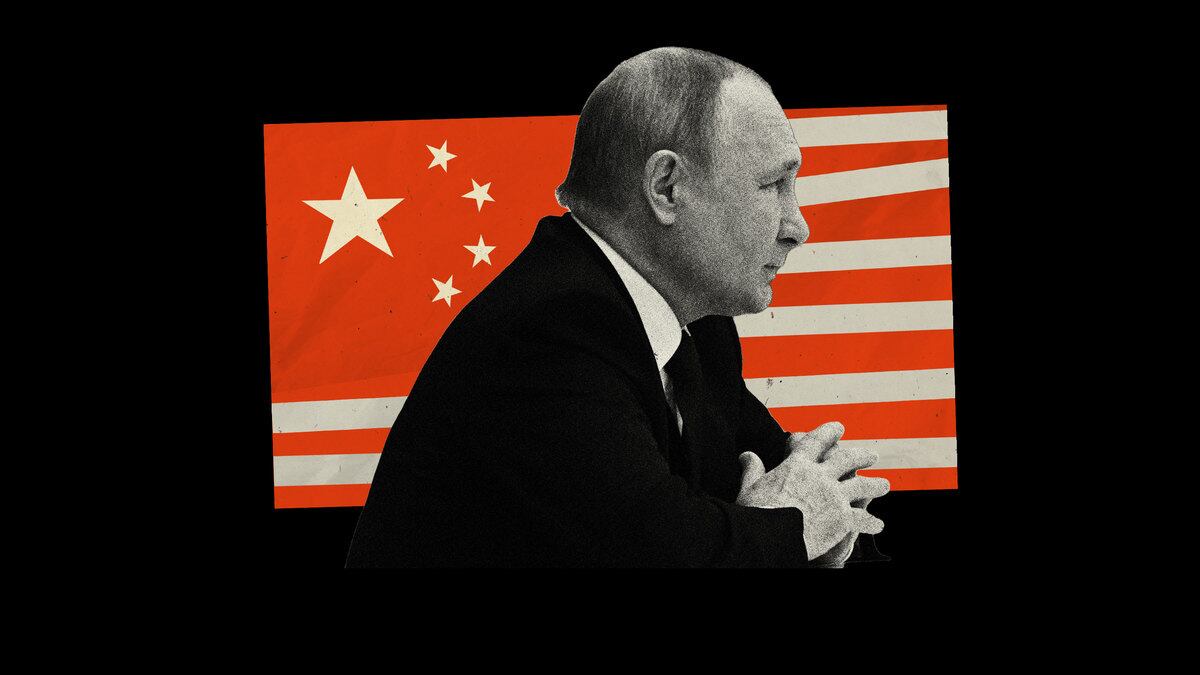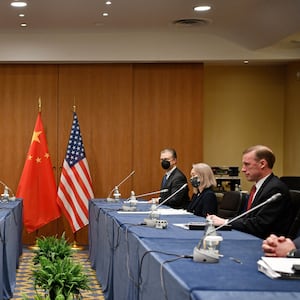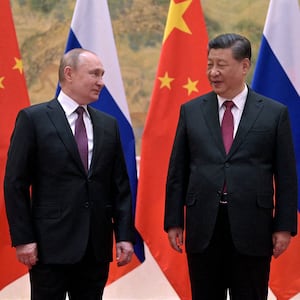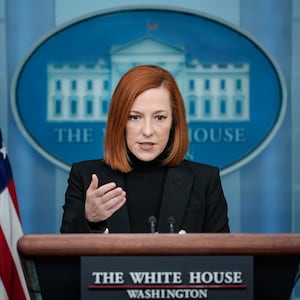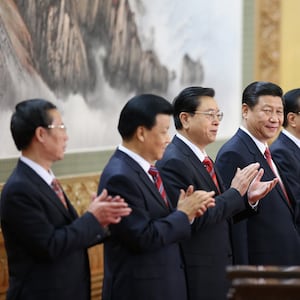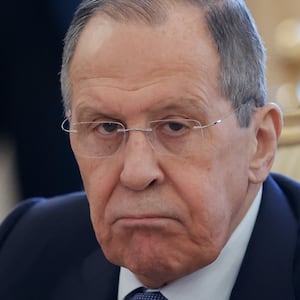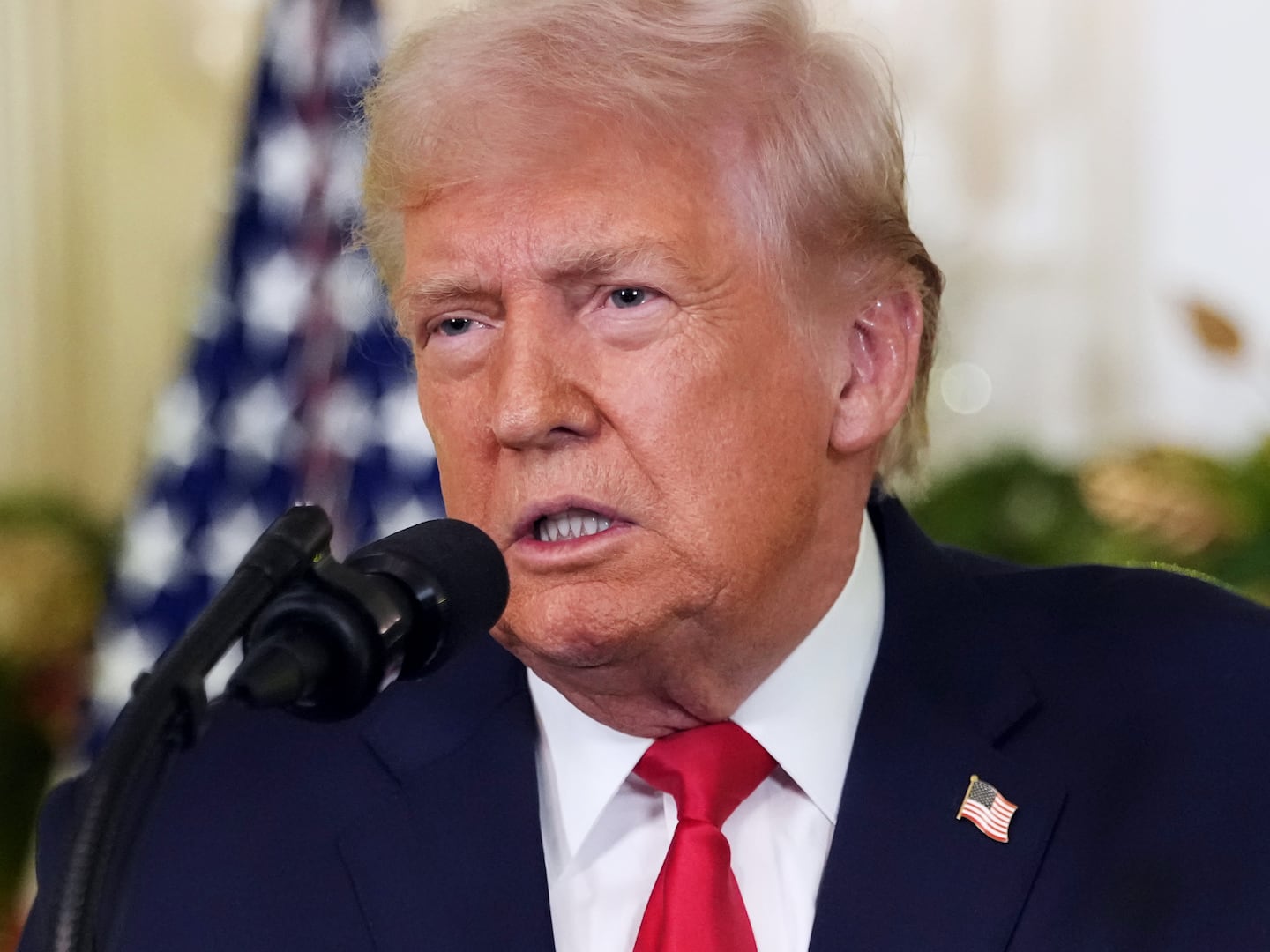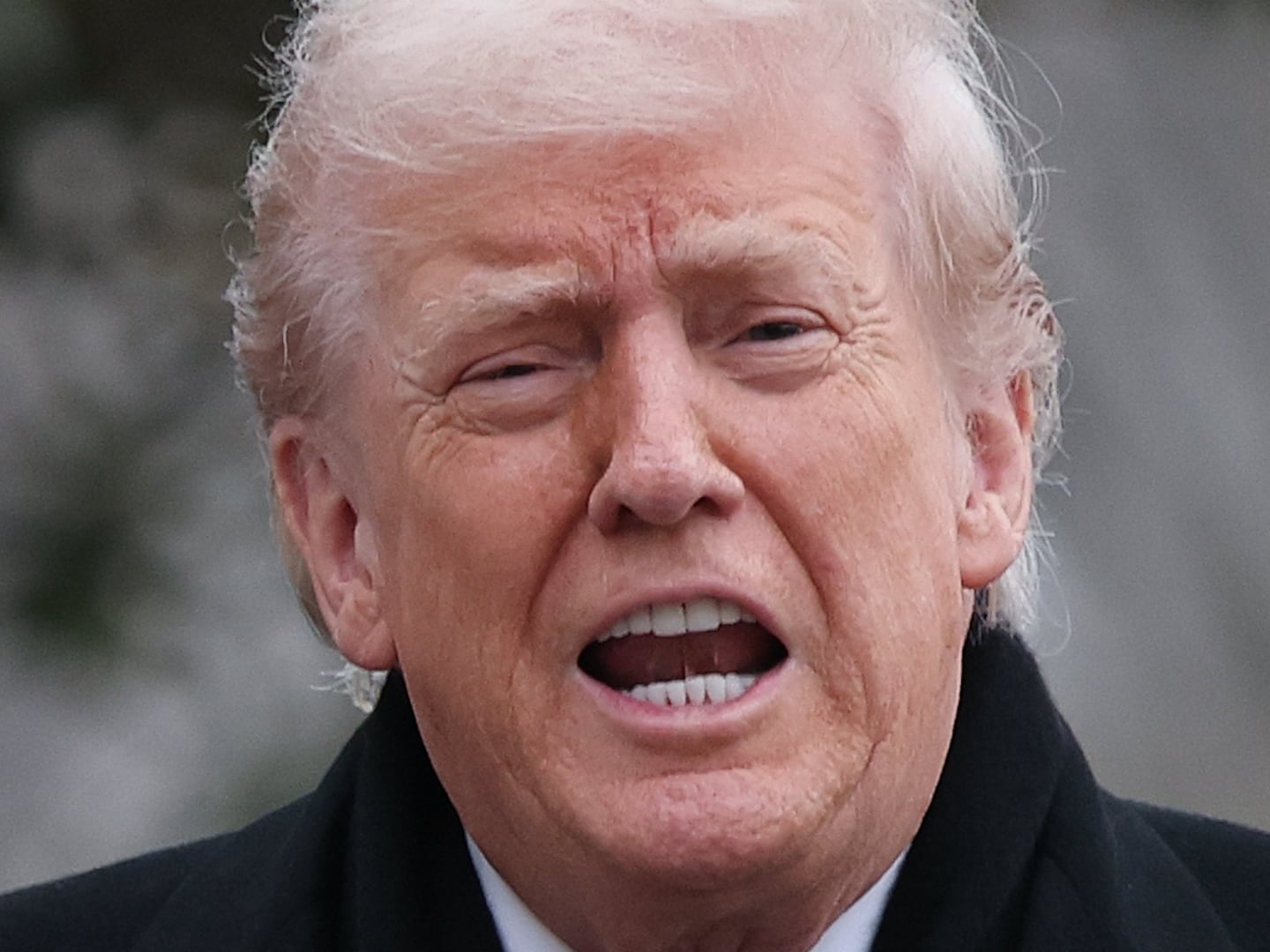President Joe Biden doesn’t exactly need another autocrat feeling isolated and off-kilter. But that’s just where Chinese leader Xi Jinping may be right now, with Russia largely cut off from the rest of the world and China wondering if it could be the next international pariah.
And yet, there’s also an opportunity for the United States and China to improve their relationship amid all the uncertainty.
Exactly where Biden and Xi stand with each other will be much clearer on Friday, when the two leaders talk for the first time since Russia invaded Ukraine. With Russia facing stiff international sanctions for its aggression, Xi may be wary of siding too directly with Russia—and, in fact, could win some points with the United States and the global community for staying out of the fight.
At the same time, Xi may see an opportunity to solidify China’s relationship with Russia, and secure an ally if China decided to try to take over Taiwan.
Either way, there should be clarity. But the fact that there’s a question at all where China stands right now is a potentially positive sign.
The CIA believes Xi has been “unsettled” by the ugliness of Russia’s war in Ukraine, and is concerned about being associated with Russia and Putin now, according to a CIA analysis shared with lawmakers on Capitol Hill last week.
But it’s not just that China may be interested in distancing itself from Russia and its heightened outcast status. Xi has also become perturbed by the fact that his own intelligence services did not accurately tell him how Russia’s invasion in Ukraine would go, according to CIA Director Bill Burns. Xi’s trepidation is presenting Biden with a unique opportunity to recalibrate the Washington-Beijing relationship.

Chinese President Xi Jinping attends the opening session of the Chinese People's Political Consultative Conference (CPPCC) at the Great Hall of the People in Beijing, China March 4, 2022.
REUTERS/Carlos Garcia RawlinsThe news from the CIA couldn’t come at a better time. Putin has reportedly asked China to provide military assistance to Russia as it invades Ukraine—and while in previous years China may have jumped at the chance to collaborate with Putin, Xi might not be so willing to stick his neck out for Russia right now.
Although a total renaissance between the United States and China is unlikely, the Biden administration may soon find itself dealing with a version of Xi more at ease and willing to reassess partnerships—at a time when he’s doubting his own team’s ability to deliver sound judgment on foreign affairs.
Hope has begun to flutter through the halls of Capitol Hill that China might now want to reshape its alliances.
“I certainly think it's possible that we can recalibrate the relationship,” Rep. Ruben Gallego, a member of the House Armed Services Committee, told The Daily Beast on Thursday.
Just days after Russia and China drew up a “no limits” partnership, Russia invaded Ukraine. But China’s lack of intelligence on Russia’s invasion, or lack of communication from Russia about Ukraine, could be rubbing China the wrong way now.
On the Chinese side, there’s likely a lot of soul-searching going on right now, according to Holden Triplett, the former head of FBI in Beijing and a former White House National Security Council director.
Xi might be “sort of licking his wounds in the sense that he got duped by Putin and his services didn’t inform him that… ‘actually, hey, they really are planning a much bigger operation than what we’ve been told,’” Triplett told The Daily Beast.
Rep. Eric Swalwell, a member of the House Intelligence Committee, also has some hope that China might tamp down and reassess its own military ambitions.
“I hope that the Chinese recalibrate their plans and intentions for Taiwan, and that they see not just the reputational stigma that Russia is suffering, but the economic price that they’ve paid, that they went from first world nation to now,” Swalwell said, adding that Russia was now “in the status of Venezuela and Iran.”
“That happened in like 10 days—so if you want to know how to lose your status in 10 days… do what Russia did,” he said.

U.S. President Joe Biden participates in a virtual meeting with Chinese President Xi Jinping at the Roosevelt Room of the White House November 15, 2021 in Washington, DC.
Alex Wong/GettySwalwell told The Daily Beast he thought the international response to Russia’s invasion would be a sign to China that “the world will respond if you're going to use military force to take over free people.”
U.S. officials have some evidence that suggests Xi might be interested in warming towards the west in light of Russia’s attack on Ukraine.
“What we are seeing now is an unprecedented level of Asian interest and focus,” Biden’s Asia Czar, Kurt Campbell, said last month at an event hosted by the German Marshall Fund of the United States.
Hu Wei, an academic with links to the State Council, also agreed, recently saying there was a window of “one or two weeks” where China could decide to embrace the west.
Despite the “no limits” relationship between China and Russia, Xi has begun to call for “maximum restraint” in Ukraine, pushing for “peaceful outcomes.”
Diplomatic channels have been on fire in the last several days to deal with China’s newfound footing. For starters, Biden’s National Security Adviser Jake Sullivan met with Chinese diplomat Yang Jiechi in Rome for an “intense” seven hours this week. And Biden’s discussion with Xi will be a massive opportunity.
But for all the optimism, Beijing might acquiesce and help Russia anyway. China has, in recent weeks, supplied a sort of tacit endorsement for Russia’s actions in Ukraine in a number of ways; it opted to not join sanctions against Russia, and it’s clear that China is more than hesitant to castigate Putin for trying to take over a country.
Lawmakers are watching the situation closely, if not dubiously.
“Russia and China have had years of cooperation. Let's not forget that they have history of this already,” Rep. Gallego said. “I don't think they’re suddenly just going to break.”
Xi is likely peeved with Putin right now. But Beijing probably isn’t ready to decouple with Moscow just yet, Rep. Mike Gallagher (R-WI), a member of the House Armed Services Committee, told The Daily Beast.
“I just see no evidence that Xi is going to abandon anytime soon… despite what I'm sure is his frustration [with] Putin,” Gallagher said. “I just don't see any plea from America disabusing Xi [of] this notion that he wants to cooperate with Russia in order to undermine, ultimately destroy, the West such as it exists.”
Even CIA Director Bill Burns admitted the partnership between China and Russia now isn’t likely “to change any time soon.”
During the Obama administration the United States and China worked on a reset. They reached an agreement that China wouldn’t hack to steal intellectual property from U.S. businesses, and trade between China and the United States continued to grow. But whatever momentum the two countries built was short-lived.
Roy Kamphausen, a former China policy director in the Office of the Secretary of Defense and adviser to the Joint Chiefs of Staff, warned against magically believing Xi would become more cooperative with the United States just because Russia’s now a pariah state.
”I wonder if Xi learned a lesson from that himself: that it didn’t pay necessarily to be too forward-thinking,” Kamphausen said.
The signs coming from China are, in fact, mixed.
“We do have deep concerns about China's alignment with Russia at this time, and the National Security Adviser was direct about those concerns and the potential implications and consequences of certain actions,” a senior administration official said on a call this week, referring to Sullivan’s meeting with Yang.

A video screen displays French President Emmanuel Macron (bottom, left), German Chancellor Olaf Scholz (bottom, right) and Chinese President Xi Jinping (up) attending a video-conference to discuss the Ukraine crisis, at the Elysee Palace in Paris, on March 8, 2022.
Photo Illustration by Elizabeth Brockway/The Daily Beast/BENOIT TESSIER/POOL/AFP via GettyThe senior official declined to comment on whether the Biden administration has seen an openness from Beijing to providing Moscow with the requested aid.
On Thursday, Gallager told The Daily Beast he thinks the Biden administration should declassify whatever information the U.S. government has on China providing aid to Russia, “if that starts happening.”
If it does happen, spreading word about China’s actions would allow the United States to “shame China for publicly trying to position themselves as a peacemaker, while behind the scenes from the start supporting Putin slaughter in Ukraine,” Gallagher added.
And yet, if China backs a proxy war in Ukraine, it could mark a dramatic shift in world order, dragging China right alongside Russia.
That sort of move from China would be surprising. As Kamphausen, an expert on China’s People’s Liberation Army and U.S.-China defense relations, told The Daily Beast, China may want to help Russia, “but I would be shocked if China actually provided military equipment to Russia.”
“As the Biden administration has made clear,” Kamphausen continued, “that’s a whole different level. The cost associated with that would be great for Beijing.”
Still, there is a destructive middle road for China. Xi might not be willing to supply military support, but sitting on the sidelines, tacitly supporting Russia’s invasion, may force the United States to act, particularly if the United States sees China weighing the consequences of reclaiming Taiwan.
It’s a situation that could break either way. But the fact that the United States is somehow looking at the prospect of an improved relationship with China as a result of Russia’s actions is remarkable.
”China is certainly thinking about Taiwan,” Kamphausen said. “There are military lessons: At the tactical level you can’t invade a place unless your logistics and command and control are in good shape.”

